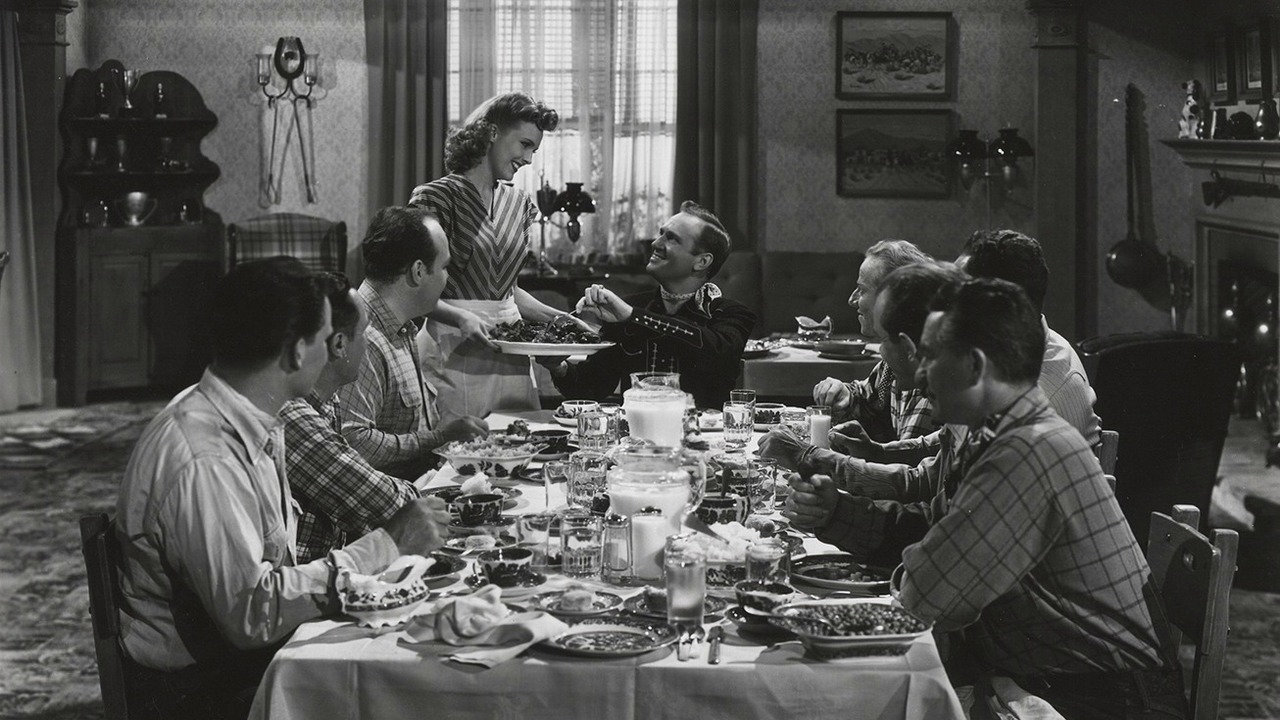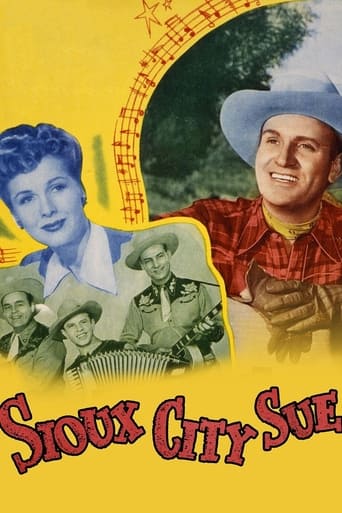



Very very predictable, including the post credit scene !!!
View MorePeople are voting emotionally.
Great visuals, story delivers no surprises
The movie turns out to be a little better than the average. Starting from a romantic formula often seen in the cinema, it ends in the most predictable (and somewhat bland) way.
View MoreBy way of contrast with his most expensive and good-by-to-Hollywood movie, "Bells of Capistrano", Gene Autry's comeback movie after his four-year stint in the Army Air Force, "Sioux City Sue" (1946), rates as more than something of a disappointment. Smiley was gone - he was now partnering Charles Starrett at Columbia - and Gene himself was somewhat chubbier. For a new partner, Gene settled on Sterling Holloway of all people, because "he was a veteran and I thought audiences would react favorably to him on that score. I was wrong, of course. I forgot how quickly people forget!"Worse, Holloway seems to be competing against Gene rather than acting with him. And even far less subtle in his approach, Richard Lane seems determined to direct all audience attention HIS way. Despite its movie-making background, the plot makes little sense - although it's nice to see photographer Reggie Lanning riding the camera car. The lovely Lynne Roberts offers some consolation, and the title song is put across with admirable gusto, but all in all, "Sioux City Sue" is a miss!
View MoreThe streak continues. I tune in to Encore Westerns every Sunday at noon for a Gene Autry flick, and I still haven't run into a repeat. Sometimes they look familiar, but after a while, a lot of them do. This one started out resembling an earlier Autry picture called "Down Mexico Way" from 1941. That one had some crooked film producers trying to scam an investment for a phony movie deal from Gene's home town. In this one, the production is on the up and up, but Gene is being tagged to lend his singing voice to a cartoon mule. Look, I only report 'em as I see 'em.Say, here's some advice for Sue Warner (Lynne Roberts), the Paragon Studio talent scout who's job it is to find and sign a cowboy crooner with a voice fairly dripping with sagebrush. The next time you get dragged by a runaway buckboard, let go of the rope! Sterling Holloway portrays Sue's assistant in a comic relief role that replaces the need for an Autry sidekick. Ken Lundy might have been that character as the cowhand with a cactus voice; fortunately that gimmick wasn't carried too far. I always liked Holloway as a kid, but I don't know if I would have that same affection today if I hadn't seen him back in the day with the likes of Gene and Roy.Fortunately, Sioux City Sue manages to get an actual role for Gene in one of Paragon's pictures that doesn't involve Ding-Dong Donkey. To do it, she had to sign on as Gene's camp cook, and even then, she was already past trying. The title song is repeated often throughout the story, along with "Someday You'll Want Me to Want You". I found the repetitive numbers to be somewhat distracting, but overall, the picture is another treat for Gene Autry fans.
View MoreSioux City Sue marked Gene Autry's return to motion pictures after service in the Army Air Corps. In the time that Gene was off the screen, Roy Rogers took over Autry's position as number one singing cowboy and would be that until both stopped making feature films. In fact Sioux City Sue was more reminiscent of the kind of film that Roy and Dale Evans would make.In fact for good measure Lynne Roberts who did a few films with Roy Rogers before World War II is thrown in for good measure. She plays a talent scout for Paragon Pictures and studio executive Richard Lane wants her to find a western type voice for a cartoon character he's launching. So Roberts and her assistant Sterling Holloway go east to the wild west from Hollywood to find a voice.Guess who's voice they find for the singing donkey, it ain't Allan Jones. Rancher Gene Autry however thinks its him they want and he goes west thinking he'll be a new singing cowboy star. Imagine his surprise when his film turns out to be a cartoon and he's the voice of a singing donkey.This was the kind of stuff Roy and Dale in their kittenish ways would be doing at Republic. My guess is this was a Rogers film script to be that Herbert J. Yates just recycled for Autry. The action also is typical B western stuff. Gene only does this because as usual he's owing money on the ranch. The climax involves the villain Ralph Sanford blowing up a dam.The title song was written several years ago and because Gene used it in a film Sioux City Sue enjoyed a revival. Bing Crosby had a hit record of it and Gene also sings Someday You'll Want Me To Want You of which Vaughn Monroe had a hit a record.Sioux City Sue is a pleasant enjoyable western comedy with enough western action for the kids and grownups would find easy to take. Best performance in this film has to be Richard Lane as the studio executive headed for an ulcer. Also Helen Wallace as Lane's secretary who proves to be a cupid in skirts.
View MoreA highly enjoyable Autry western, boosted by a spirited supporting cast, a non-formula script, and a sprinkling of very listenable songs including the delightful title number. Autry was always an unlikely cowboy hero, short, stout, and wooden, yet his way with a song was always pleasant and natural, while his horsemanship and fight scenes were as convincing as any. His secret of success may well have been his ordinariness. Unlike a towering John Wayne, Crash Corrigan, or innumerable other icons of the Saturday matinée, Autry was always within reach of the audience, a reassuring nearness for those of us who knew we would never grow into the boots of a Wayne or Corrigan. Anyway, I suppose the audience for this kind of innocent bucolic fun dwindles each year as we matinée kids age and shuffle off, leaving such fare to film historians and curiosity seekers. Historians should find this film particularly revealing for its behind-the-scenes look at the making of musical westerns, and also for a fluttery Sterling Holloway, a most unlikely comic relief for the macho western, which, I suppose, amounted to someone's comment on the film industry since he appears as a production assistant. The leading lady also goes against type. A hard-driving studio scout, who overshadows the laid-back Autry, she defies patriarchal expectations by remaining with the studio at film's end. All in all, this programmer rises above the low expectations of a cowboy movie and remains well worth a look on several levels.
View More